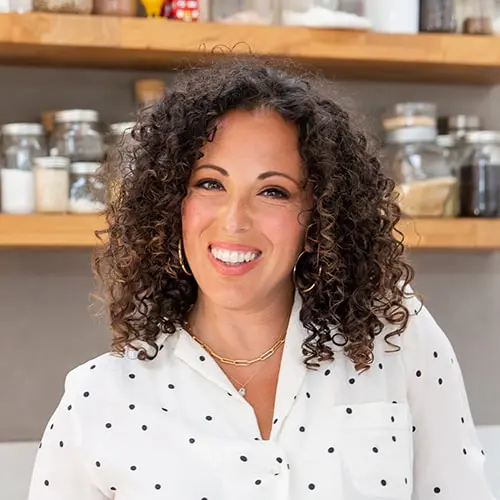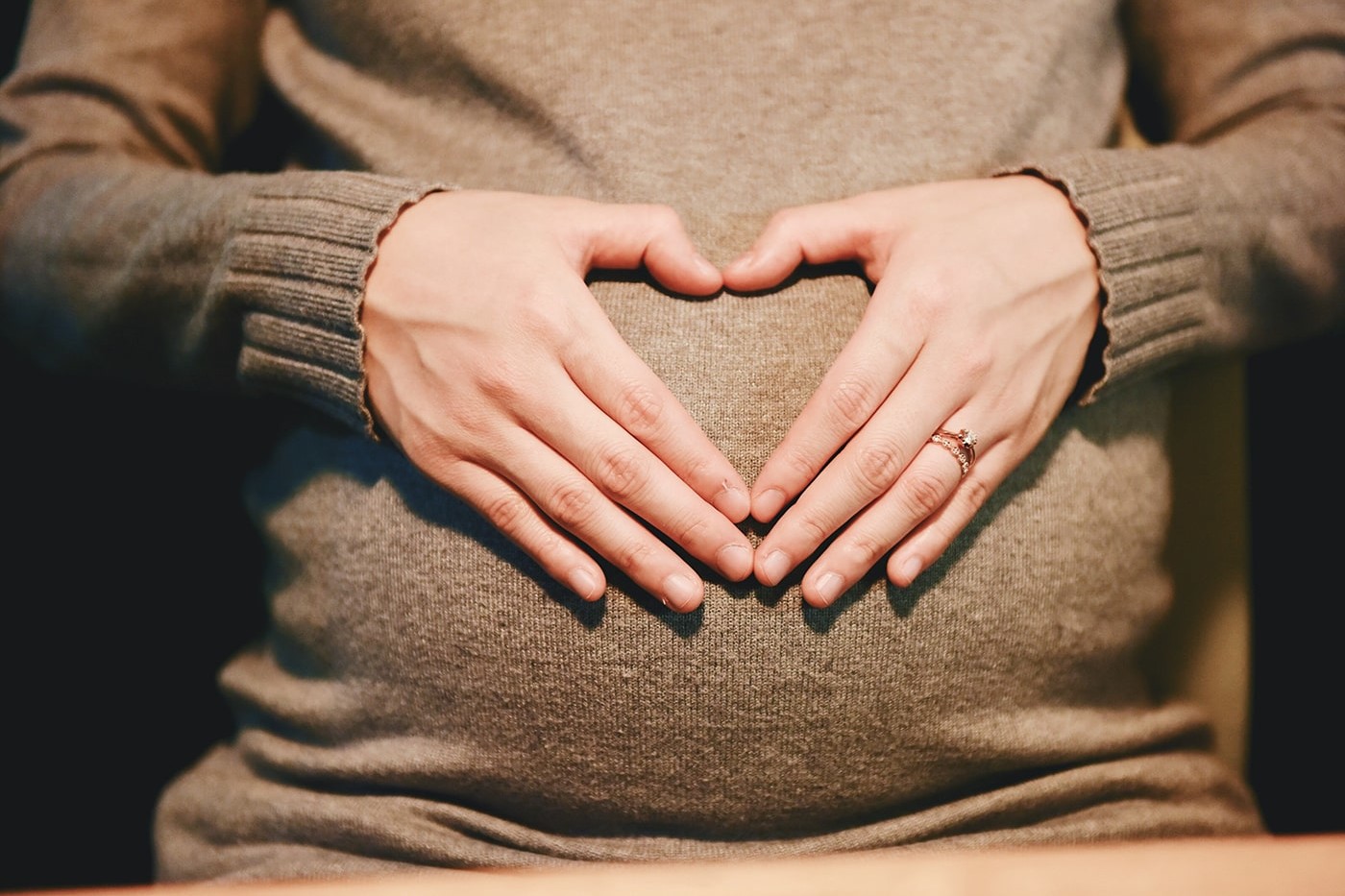Check out “Endometriosis 101 Part 1: What Is this Condition & Why Is it Happening to Me?” HERE
While functional medicine practitioners don’t know with certainty the root cause of endometriosis either (we’re still waiting on the science), we focus on what we do know about the condition by working to reduce inflammation and support the immune system.
Pain management and even surgery might be part of our treatment plan – but I would never see a woman in endometriosis pain and just throw the birth control pill at her! I am not interested in band-aids. I want real solutions for my patients.
Here’s how we address endometriosis (but remember that every treatment plan needs to be customized for your unique needs):
These steps can happen in any order or all at once, depending on your situation.
#1 Heal The Gut
Addressing gut health should always be high on your list for really any health concern, but especially for anything autoimmune.
I often see bacterial infections like SIBO (Small Intestine Bacterial Overgrowth), parasites, viruses, mold and toxin exposure, and food sensitivities. In studies, 80% of women with endometriosis also had SIBO.
These can all be signs and triggers for leaky gut, so addressing them and then working to heal the gut is key to recovery.
I like to start with a comprehensive stool test like the GI Map to find any gut health issues. Then we’ll work to clear any infections and implement dietary changes to support the gut (this could be an elimination diet, but that is not always the answer!).
One dietary change I do recommend? Cutting dairy and soy. There is a lot of research to support the idea that dairy and endometriosis are not good together. Dairy is hormonal, it’s a really common allergen, and it’s also pro-inflammatory. (As is soy.)
Do you have to quit them both forever? Absolutely not. Once you have endometriosis under control, you can probably enjoy them again in moderation. And of course, quality and quantity matter a lot. Go for grass-fed and organic, minimally-processed dairy when you do have it.
Another thing I look for on stool tests is high beta-glucuronidase. Beta-glucuronidase is an enzyme produced by gut bacteria and can be elevated by parasites and other gut infections. When beta-glucuronidase is high, it can lead to estrogen buildup. If you have high beta-glucuronidase, I’ll use calcium d-glucarate and Lactobacillus to help lower this and reduce the estrogen recirculation.
#2 Reduce Inflammation
Next, we’ll take a look at your lifestyle and see what could be leading to increased inflammation. It could be late nights at the office, too many meals out, drinking too much, or even “healthy” habits like over-exercise or a really restrictive diet.
Overtraining isn’t an issue for all women – but you might be surprised how easy it is to become “overtrained” with even a moderate exercise regimen. Remember, overtraining isn’t necessarily about too much exercise… it’s about too much exercise relative to too little recovery. That’s why Olympic athletes can exercise so much without overtraining – they spend all the rest of their time recovering! But for women who have to work, commute, get dinner on the table, do laundry, etc. etc. etc. there is rarely enough recovery time!
Stress in any form is incredibly inflammatory, but it’s not the only inflammatory element to look out for. The modern world is pretty rife with chemicals… and no one wants to think about the cumulative effect of the pollution we breathe (drink and eat, too!), the chemicals in all the products we use (from cleaning to personal care), or the added ingredients in most of our food (including unwanted pesticides and other chemicals). But – it all adds up to a lot of potential inflammation.
But, you don’t have to start living like a monk and throw away everything plastic in your home. I’ll help you choose where you can make a few key changes to reduce overall inflammation.
#3 Stabilize Blood Sugar
One big myth is that weight loss can help with endo symptoms. If you’re carrying a lot of excess weight, losing weight can potentially help with symptoms (since hormones are produced in fat cells) – but that doesn’t mean weight loss is a “cure.”
If you’re already lean, the extra stress on the body of trying to lose more weight can make your symptoms worse. And even if weight loss is one part of your healing plan, it’s definitely not the whole story.
Rather than emphasize weight loss, I like to focus on stabilizing blood sugar with a whole-foods based diet.
This is really important because higher blood sugar levels lead to increased insulin, which stimulates the conversion of testosterone into estrogen. This is just another contributor to the high estrogen levels that are linked to endometriosis.
#4 Balance Hormones
You can’t diagnose hormone imbalance based on symptoms, so I never start a hormone protocol without testing. I use the DUTCH Hormone Panel with my patients.
Once we’ve identified your imbalance, we’ll come up with a plan to correct it – everything from herbals and supplements to acupuncture, exercise, diet, and stress management can come into play.
Some of the herbs and supplements I use most often are:
Melatonin
Melatonin is an antioxidant that has been shown to be able to reduce pelvic pain associated with endometriosis. Now, I don’t want to give out a dose because it’s not the typical low dose that people use to help them sleep. It’s actually a pretty high dose. And it can definitely make people groggy. As a practitioner, I want to make sure it’s appropriate for you. But in the right dosage, melatonin can reduce endometriosis pain by as much as 40%. And it’s safer than the pharmaceutical options by far!
Before supplementing, you can also do things to naturally increase your own melatonin levels like have good sleep hygiene, avoid caffeine, avoid blue light after three in the afternoon, and sleep in a dark room.
Vaginal Probiotics
This is one of my favorite tools – and yes, it is what it sounds like: just take probiotics, and stick them up there! This is really safe and one of the easiest ways to shift the vaginal microbiome.
(If you have chronic yeast or bladder infections, or bacterial vaginosis, this can also help with those conditions in many cases!)
The brands I recommend are Jarrow’s Fem-Dophilus and FloraFemme.
Pycnogenol
Pycnogenol is another really well-known antioxidant that’s very specific to lowering pain and lesions in endometriosis. It’s safe and effective for many women.
Bioidentical Progesterone
This really depends on the woman and proper hormone testing. Please don’t go buy some natural progesterone cream and start self-supplementing! Getting the dose right and monitoring while you use it is so important.
But this works because proper progesterone levels balance and oppose estrogen. Think of it like a teeter totter. But in women with endometriosis, there is evidence that they may have progesterone resistance and therefore need slightly higher progesterone levels than the average woman to achieve that balance.
DIM
Diindolylmethane (DIM, in short) is a phytochemical found is cruciferous veggies (think broccoli, cauliflower, brussels sprouts etc.) and it’s one of my favorite tools for estrogen dominance. It helps balance levels of different types of estrogen and block androgen receptors. Get it from eating lots of veggies, or try a supplement.
#5 Support Better Detox
Your body knows how to detox itself (thanks to your liver, kidneys & more) – and you don’t need a 10-day juice fast to “cleanse.” But that doesn’t mean we can’t support detox.
Your detox symptoms can easily become overburdened when you consider the amount of toxins you’re exposed to (pollution, chemicals in cosmetics, pesticides on food to name a few). Your liver can get “jammed” trying to detox as much as possible – which can then burn through your glutathione stores and leave you feeling totally burnt out.
And remember – your liver also plays a major role in detoxing excess estrogen, so if it’s jammed up, you’re setting yourself up for estrogen dominance.
I’ll have you take a look at where you’re being exposed to toxins as well as teach you some easy tricks for supporting the body’s detox processes.
These are some of the supplements I love for supporting better detox:
Calcium D-Glucarate
Calcium d-glucarate is one I mentioned before for gut health. It is a supplement that’s pretty safe to play with if you have endometriosis because you can assume that you have some level of estrogen dominance. But again, I like to use it based on stool testing so we can be certain that excess beta-glucuronidase enzyme is in fact a part of your issue. Because why take excessive supplements that are not doing for you what you need? That’s a waste of time and money.
N-Acetylcysteine
I always say this is the supplement I would take if I was trapped on a deserted island… it’s just awesome. It has many uses and it supports the production of or master antioxidant, glutathione (which we all need more of!)
In a double-blind study, 92 women with endometriosis were either given NAC or no treatment. And during the NAC treatment, they saw a distinct reduction in the number of cysts or tissue implants, as well as size. In the women using NAC, lesions stayed the same or actually shrunk.
In the no treatment group, lesions tended to grow! The NAC was more effective than hormonal treatments.
And the crazy part is that 24 women in the NAC treatment group who had scheduled laparoscopy actually cancelled their surgery because they had such a great reduction in pain. One woman even got pregnant!
I can’t recommend NAC highly enough. But quality does matter – I usually use physicians-grade from brands like Pure Encapsulations, Thorne, or Designs for Health. I like to use 500 mg, 2-3 times daily.
One caveat: if you have acute gastritis (inflammation of the gut lining) NAC can thin the gut wall slightly, so it might not be right for you.
Don’t Just Accept Endometriosis or Painful Periods
I would never lie and tell you that I have a magical cure for endometriosis. I don’t (and no one does).
What I do have is a holistic approach to healing that takes into account not just symptom management – but also addressing the root causes so that you can experience true relief.
Because there are multiple layers to healing endometriosis, I recommend you get support from an experienced practitioner. A practitioner can help you assess your gut health, hormones, and detox symptoms and strategize healing. Working with an experienced practitioner can turn and a long and frustrating process into a much shorter one. (The majority of my clients see major, lasting improvements in just 3-6 months.)
It’s very possible to be symptom-free, even with endometriosis. It’s very possible to see heavy bleeding, painful periods, and PMS go away. I’d love to help you.
You can book a free 15-minute consult with my team right now. During the call, we’ll listen to you and explore how we could guide your health forward (no obligation!).
Periods shouldn’t be painful or something to dread! I’d be honored to help you take back control and feel better.
P.S. Do you feel like you’re already eating well, managing stress, and STILL struggling with endometriosis? I’d love to learn more and see if we can’t get you feeling better. Book a free 15-minute consult today.
At the Reverse-Age Method, we believe in a holistic approach to perimenopause and beyond, that addresses the root causes of your symptoms (like insomnia, hot flashes, night sweats, erratic periods, fatigue, skin aging, weight gain, and brain fog)– to also slow the pace that your cells are aging. Whether it’s improving gut health, optimizing detox function, enhancing mitochondrial function, or building muscle mass, our comprehensive program has got you covered.
If you’re new here, be sure to check out our Blog Page for more insights and tips on how to thrive during perimenopause. Our blog is packed with practical advice, success stories, and the latest research to help you on your journey.
For more updates and community support, follow us on social media:
You May Also Like...
Are Worms The Next Frontier of Health? Everything You Need to Know About Helminth Therapy
I talk a LOT about clearing infections and overgrowths - Small Intestine Bacterial Overgrowth (SIBO), yeast overgrowth…
My Not-So-Glowing Pregnancy Truth: How I Wound Up With Gestational Diabetes (And What I’m Doing About It)
I’ve been really lucky to enjoy every moment of my pregnancy so far. I feel good. I’ll even say I’m “glowing”! I’m so…
Whether you’re looking for help with your gut, your hormones, or both, our team of practitioners work together to treat the WHOLE you – guiding you to a healthier mind, body, and spirit day by day.



